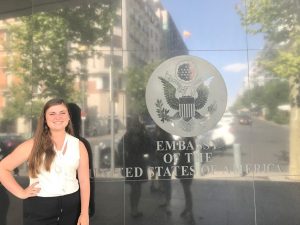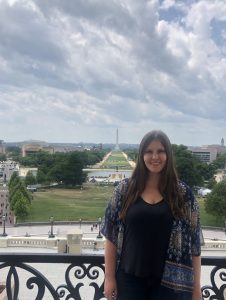Upon entering the workforce, Carolina history majors quickly realize that the skills they developed in their history classes can transfer to a variety of fields. This summer, the Department’s Undergraduate Summer Internship Awards gave five undergraduate students the opportunity to explore the benefits of their coursework firsthand by funding their internships at NGOs, historic sites, and government offices.
These competitive awards provide $1,000 to $3,000 to undergraduate students who want to pursue any unpaid internship that broadly relates to their study of history or helps them develop skills relevant to the major. This year, Sarah Cheeley interned with the US District Attorney for the Western District of North Carolina. Kimberly Oliver pursued an internship at the Stagville State Historic Site in Durham, which includes the remnants of one of the largest plantation labor camps in North Carolina. Aaron Sugerman travelled to London to work at the Transatlantic Forum for Education and Diplomacy, a non-governmental organization focused on promoting global dialogue and understanding through the humanities.

In this position, Blake-Harris wrote daily press reports, took notes in embassy meetings, supported fundraising efforts, and managed the Embassy’s social media pages. She also helped plan public events, including a Fourth of July party and a collaborative event between NASA and Spanish King Felipe’s administration to celebrate the fiftieth anniversary of the moon landing.
Upon arriving in Madrid, Blake-Harris realized that she would play an even more essential role at the Embassy than she had initially expected. “The US Embassy was chronically understaffed, so all the interns basically got to work as foreign service officers and act as representatives for the Embassy at events in Spain. I actually got to meet the foreign minister for the EU,” she said.
Blake-Harris, who plans to take the Foreign Service Officer exam this winter, saw direct connections between the skills she developed as a history major and those she used in her internship. “I had to write talking points about the United States’ foreign policy direction to reassure Spain as a NATO member and also as a key ally. It was basically what I had to do for my History 398 research paper: find all these sources, cite the NATO Secretary General, cite Secretary of State Mike Pompeo, and build a cohesive talking point for the Counselor for Public Diplomacy and for the Ambassador to speak on,” she said.

Brady also relied on the writing and analysis skills she honed in her history classes at Carolina. She wrote mass mailings to constituents, explaining how Congressional acts would affect the district. Brady covered topics as diverse as infrastructure-building and the legalization of hemp, but her favorite focused on the bipartisan African American Burial Grounds Network Act, which provides federal support to preserve neglected sacred sites.
The internship helped Brady better understand the issues facing her home district, and it also helped her learn to collaborate with people who hold different political views. “I definitely felt that I was able to grow as a young professional and someone who wants to work on bipartisan issues,” she said.
Brady encouraged other students to consider interning for a representative from their home district, even if they must cross party lines to do so. “If you’re interested in a Congressional internship, you should look at the political reality of the office you’ll be working in. Then, weigh the pros and cons of how that will affect you and whether you think you can separate yourself from the politics and take the skills, because it’s something you can gain a lot of experience from.”
– Aubrey Lauersdorf
